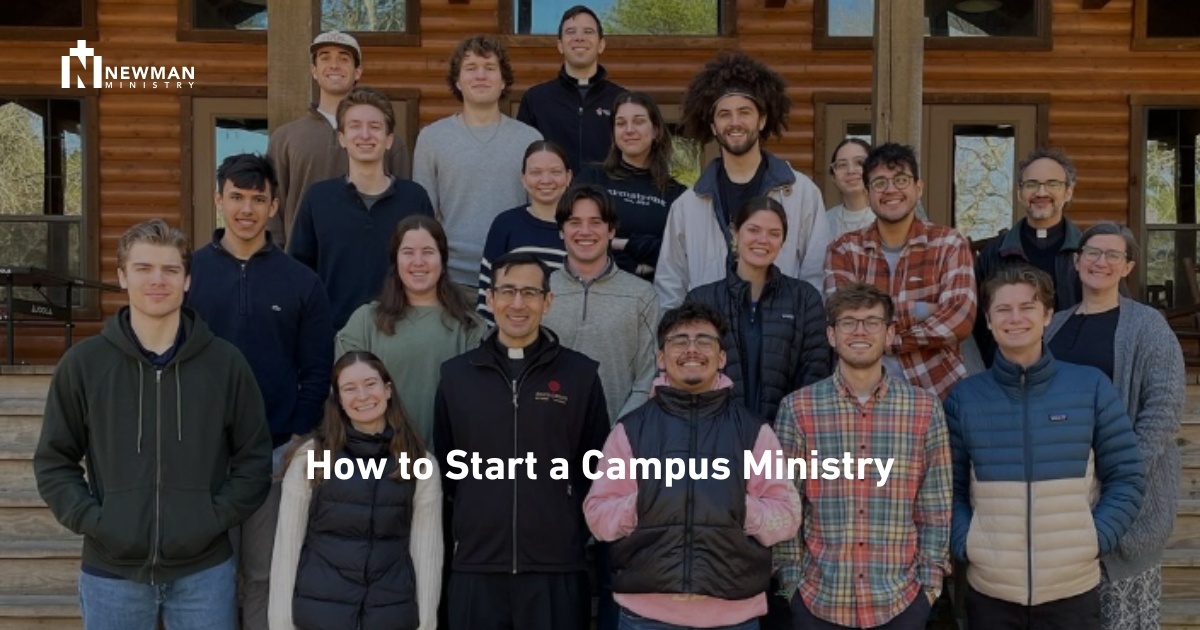
Starting a Catholic campus ministry is such a rewarding experience! It gives students the support, community, and spiritual resources they need to thrive during their college years.
If you’re a:
- University faculty
- Ministry professional
- Member of a parish near a college campus
- or just someone who has a passion for keeping young adults connected to their faith
…this guide will walk you through the essential steps to establish a thriving Catholic ministry on a college campus.
 Detroit Catholic Campus Ministry New Student Welcome
Detroit Catholic Campus Ministry New Student Welcome
Pray
Before diving into the practical steps, it’s essential to cover your ministry in prayer. Seek the guidance and help of the Holy Spirit for wisdom and direction.
- Pray for discernment and clarity in your vision and mission.
- Ask for the Holy Spirit’s guidance in identifying the right leaders and volunteers.
- Pray for open hearts and minds among students, faculty, and administration.
- Seek God’s provision for financial and material resources.
- Pray for unity and collaboration within your team and the wider campus community.
Research and Planning
Identify the Need
It’s important to first get a feel for the interest and need for a Catholic ministry on campus by talking to students, faculty, and staff through surveys and interviews. Additionally, be sure to analyze your student population's demographics. By collecting demographic information, you can learn about the diversity and makeup of the student body.
Lastly, check out the current religious organizations and spiritual resources on campus to see what's already available and where there might be gaps.
Define Goals and Objectives
No venture will go anywhere without a clear goal in mind and a vision for what the venture will accomplish or become in the future. This is why we suggest you do a few things first:
- Create a clear mission statement that explains the purpose and values of the ministry.
- Develop a vision statement outlining the desired outcomes and impact of the ministry.
- Establish SMART goals (specific, measurable, achievable, relevant, and time-bound).
Establish Student Leadership
Start by recruiting core team members. Look for and invite students who demonstrate leadership qualities and a strong commitment to the Catholic faith. Once you have your team, delegate responsibilities by assigning roles based on each member's strengths and skills. For example, some students may excel in event planning, outreach, communications, fundraising, or pastoral care.
Engaging your student leaders is crucial, so encourage teamwork and open communication among core team members through regular meetings and team-building activities.
Gain Institutional Support
Support and Approval from the Diocese
Begin by doing your homework to get familiar with your diocese's structure and guidelines for campus ministries. Ensure that your plans align with their mission and values. Building connections is essential, so reach out to key diocesan leaders and set up meetings to share your vision and plans. During these meetings, highlight how your ministry will benefit the community and fit into the bigger picture.
When pitching your plan, put together a strong, detailed proposal that covers your goals, activities, and how you will stay accountable. Be prepared to address any questions or concerns they might have. Additionally, make use of any resources the diocese offers, such as training programs or funding opportunities. Ask your diocesan contacts how to gain access to the sacraments for your new ministry.
Connect with Campus Authorities
Identify key stakeholders, such as university administrators who can approve and support your ministry. Request meetings with these individuals to discuss your proposal, clearly explaining its purpose and importance. During these meetings, present your proposal in detail and highlight the benefits of establishing a Catholic ministry on campus.
Offer evidence of community support and potential collaboration opportunities with other university organizations and the wider community.
Secure Funding
Start by researching various funding sources, including university grants, local parishes, diocesan funds, and Catholic organizations. If you're unsure where to begin, there are many resources and guides available to help kickstart your fundraising efforts. Develop a detailed budget that outlines your expected expenses and costs to provide a clear financial plan for your ministry.
Once your budget is in place, identify potential funding partners and reach out to them. Share your ministry's mission, goals, and budget, emphasizing the positive impact your ministry will have on the campus and community.
 SMU Catholic Silent Retreat 2024
SMU Catholic Silent Retreat 2024
Recruit Volunteers and Staff
To recruit volunteers, start by spreading the word through various channels, such as social media, campus announcements, flyers, and word-of-mouth. Leveraging these platforms will help you reach a broad audience and attract individuals who might be interested in supporting your ministry.
Collaborate with campus organizations, including student clubs and religious groups, to recruit volunteers. At orientation events and other campus gatherings, you can introduce them to your ministry's mission and activities. The best way to invite people to help is to personally invite them.
Develop Programs and Activities
Worship Services
Partner with local priests to organize regular Masses and liturgical celebrations, ensuring that students have consistent opportunities to engage in their faith. Secure a dedicated space on campus for worship and prayer, or arrange to use a local parish's facilities to provide a sacred environment for students. Encourage students to actively participate in liturgical services as altar servers, lectors, musicians, or Extraordinary Ministers of Holy Communion (EMHCs).
Faith Formation
Provide a range of faith formation programs tailored to students’ interests and needs. Options include Bible studies, where students delve into Scripture together, and discipleship groups that foster deeper spiritual connections and mentorship.
Plan and organize retreats and spiritual conferences aimed at personal reflection and renewal. These events provide students with dedicated time away from their daily routines to focus on prayer, contemplation, and deepening their faith.
 Catholic Campus Ministry at Virginia Commonwealth University Baccalaureate Mass
Catholic Campus Ministry at Virginia Commonwealth University Baccalaureate Mass
Service and Outreach
Service and outreach are integral to fostering a compassionate and active faith community on campus. Establish partnerships with local charities, nonprofits, and community organizations. Collaborate to organize meaningful service projects that address local needs and engage students in hands-on volunteer work.
Integrate service-learning opportunities into your ministry's programs and events. Equip student leaders with the necessary tools, resources, and support to initiate and lead service initiatives within the campus community. Provide training on project management, communication skills, and organizing service events effectively.
Promote and Publicize
Marketing and Outreach
Effective marketing and outreach are essential to connecting with students and increasing participation in campus ministry. Here are some ways you can engage the students on campus:
- Maintain an active presence on social media platforms. Share updates about upcoming events, testimonials from participants, and inspirational content that resonates with your audience.
- Utilize physical bulletin boards and digital signage across campus to announce ministry events, programs, and initiatives. Design and distribute flyers and postcards to promote specific ministry activities and distribute them in high-traffic areas such as student centers, dorms, and academic buildings.
- Encouraging current members and volunteers to share their positive experiences with friends, classmates, and peers.
- Host events that encourage networking and allow attendees to invite others who may be interested in joining the ministry.
Collaborate with Campus Partners
To collaborate effectively with campus partners, begin by identifying opportunities to collaborate with other student organizations and academic departments. This involves exploring shared interests or goals that align with your ministry's mission, such as community service initiatives or educational workshops.
Participating in campus events and expos is another valuable strategy. These events provide platforms to engage directly with students, faculty, and staff, showcasing your ministry's activities, values, and contributions to the campus community.
Foster Community and Support
Build Relationships
Building strong relationships within your ministry involves creating a supportive and inclusive environment where everyone feels respected and valued. Try these ideas to create a connected faith community:
- Utilize digital platforms like the Called app to foster a vibrant digital community where members can stay updated on news and events and engage in ongoing conversations.
- Organize social gatherings and group activities that promote teamwork and support among members.
- Celebrate and honor different backgrounds, perspectives, and experiences through student-led cultural fairs, shared meals, or Masses offered in different languages.
By cultivating a culture of inclusivity, you create a welcoming space where individuals can grow spiritually and personally.

Catholic Campus Ministry Ole Miss
Provide Pastoral Care
Providing pastoral care within your ministry involves ensuring there are confidential avenues for students to seek counseling and support. Host small groups focused on specific issues or challenges students face, offering a safe space for sharing and faith-based exploration.
Collaborate with campus counseling centers and health services to enhance the support available to students. This partnership offers students comprehensive care addressing both spiritual and emotional needs.
Mentorship and Discipleship
Pairing students with experienced mentors provides both personal support and spiritual growth, offering a valuable avenue for accountability. Provide training and resources for mentors to equip them with the necessary skills and knowledge to effectively support their mentees.
By nurturing discipleship, your ministry cultivates an environment where students can deepen their faith and develop meaningful connections.
Evaluate and Adapt
Assess Effectiveness
Start by defining clear evaluation criteria that align with your goals and mission. Establishing these standards will provide a framework for measuring success. You can gather valuable data through:
- Student and staff surveys
- Attendance logs to track participation in ministry events
- suggestion boxes or online forums
Establish channels of communication that allow community members to share their thoughts and experiences easily and with transparency.
Once you have gathered data, analyze the results to identify strengths that can be built upon, weaknesses that need attention, and opportunities for improvement. Be sure to celebrate successes by acknowledging the hard work and achievements of volunteers and participants. Recognizing and celebrating milestones motivates continued engagement.
Take decisive action based on the feedback received and communicate updates and outcomes from the feedback process with stakeholders to demonstrate that you value their input and are committed to making meaningful changes within your ministry.
Starting a Catholic campus ministry is no small feat—it takes planning, dedication, and teamwork. However, the payoff of offering students spiritual support and a sense of community during their college journey is priceless. By following the steps laid out in this guide and staying true to the mission of walking with students on their faith journey, you can build a vibrant ministry that leaves a lasting impact on student's lives and enriches the entire campus community.
Other Ways We Can Help You in Your Ministry
Newman Ministry exists to connect students with a Catholic community on campus so their Faith thrives in college and beyond. Here’s how we ensure high school seniors keep their faith in college and campus ministers are equipped to inspire lifelong disciples:
- High School Outreach, our flagship program, connects high school seniors to campus ministries at their college of choice before they get to campus. Update your campus ministry info and access your student list. Meet your new students . >>>
- First90 is our coach-led, cohort-based program made for campus ministers to set their ministry up for long-term success. If you’re a campus minister, we equip you to work more effectively and better focus your time and energy on ministering to your students. Learn More Today. >>>
- Campus Minister Small Groups provide a space for campus ministers to set and accomplish personal and professional goals alongside other campus ministers with a Newman Coach as the guide. Join a Newman Group Today. >>>
- Campus Minister Digital Community The Newman Campus Minister Community is the best place for you to network with peers and find inspiration for your ministry. Join The Cm Community Today. >>>



